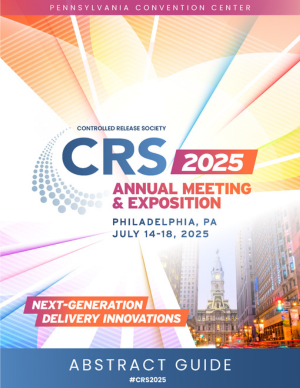Industry Session
Innovation Showcase
Advanced Capabilities in Polymer Development for Drug Delivery and Medical Device Applications
Tuesday, July 15, 2025
6:15 PM - 6:20 PM EDT
Location: Terrace Ballroom 3/4
As regulatory guidelines and quality environment on excipients are constantly strengthening, it becomes more and more crucial to support introduction of new molecules and/or formulations on the market by high-end analytical characterization of the Drug Substances, including polymer excipients.
When creating new GMP production capacities adapted to polymers, to ensure the highest quality and performance, we deployed a range of advanced analytical methods of which certain are very specific to polymers. High resolution 500 MHz NMR spectroscopy allows a detailed structural analysis, while GPC coupled with Multi-Angle Light Scattering (GPC MALS) provides precise molecular weight distribution data. Rheology and viscosimetry are utilized to study the flow and deformation behavior of polymers, which is crucial for their application in drug delivery systems and medical devices. DSC experiments can also reveal important properties such as glass transitions, phase changes, melting, crystallization, product stability. Additionally, innovative analytical techniques can offer live monitoring of ongoing reactions during the process (IPC). For instance, using vibrational viscometer probes allows to follow polymerization degree live and NIR spectrophotometry probes allows to measure the concentration of different species.
A versatile and advanced analytical is the ideal complement of a chemistry capacity including the synthesis of a wide variety of polymers, such as PLA/PLGA and PCL, as well as hydrosoluble polymers like PEG, PEI, PLL, polyoxazolines, polyacrylates, and modified polysaccharides.
When creating new GMP production capacities adapted to polymers, to ensure the highest quality and performance, we deployed a range of advanced analytical methods of which certain are very specific to polymers. High resolution 500 MHz NMR spectroscopy allows a detailed structural analysis, while GPC coupled with Multi-Angle Light Scattering (GPC MALS) provides precise molecular weight distribution data. Rheology and viscosimetry are utilized to study the flow and deformation behavior of polymers, which is crucial for their application in drug delivery systems and medical devices. DSC experiments can also reveal important properties such as glass transitions, phase changes, melting, crystallization, product stability. Additionally, innovative analytical techniques can offer live monitoring of ongoing reactions during the process (IPC). For instance, using vibrational viscometer probes allows to follow polymerization degree live and NIR spectrophotometry probes allows to measure the concentration of different species.
A versatile and advanced analytical is the ideal complement of a chemistry capacity including the synthesis of a wide variety of polymers, such as PLA/PLGA and PCL, as well as hydrosoluble polymers like PEG, PEI, PLL, polyoxazolines, polyacrylates, and modified polysaccharides.

Derek Richards
Director of Business Development CRDO
Seqens
Newburyport, Massachusetts, United States


